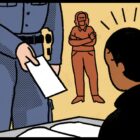
In late September, Torri was driving down the highway with her 11-year-old son Junior in the back seat when her phone started ringing.
It was the Hamilton County Sheriff’s deputy who worked at Junior’s middle school in Chattanooga, Tennessee. Deputy Arthur Richardson asked Torri where she was. She told him she was on the way to a family birthday dinner at LongHorn Steakhouse.
“He said, ‘Is Junior with you?’” Torri recalled.
Earlier that day, Junior had been accused by other students of making a threat against the school. When Torri had come to pick him up, she’d spoken with Richardson and with administrators, who’d told her he was allowed to return to class the next day. The principal had said she would carry out an investigation then. ProPublica and WPLN are using a nickname for Junior and not including Torri’s last name at the family’s request, to prevent him from being identifiable.
When Richardson called her in the car, Torri immediately felt uneasy. He didn’t say much before hanging up, and she thought about turning around to go home. But she kept driving. When they walked into the restaurant, Torri watched as Junior happily greeted his family.
Soon her phone rang again. It was the deputy. He said he was outside in the strip mall’s parking lot and needed to talk to Junior. Torri called Junior’s stepdad, Kevin Boyer, for extra support, putting him on speaker as she went outside to talk to Richardson. She left Junior with the family, wanting to protect her son for as long as she could ...

TUCSON, Arizona — Adriana Grijalva was getting ready to head to class at the University of Arizona in the fall of 2022 when she got a text message from her cousin telling her to stay put. The cousin, who works in maintenance at the university, had watched law enforcement descend on campus and reached out to make sure she was safe. A former student had just shot a professor 11 times, killing him.

Equal Justice USA (EJUSA) announced October 8 that it will partner with four new communities to build new restorative youth justice diversion programs. Restorative justice includes an accountability process that identifies root causes of youth criminal actions, while providing an opportunity for healing both for the person harmed and the person who has caused harm.

Louisiana is the only state to pass and then reverse Raise the Age legislation. Louisiana’s criminal justice system now treats all 17-year-olds as adults. Is reversing Raise the Age making a difference in the number of violent crimes by 18-year-olds?
More Headlines

When they voted earlier this year to let police officers use a dangerous form of restraint on students in schools, Minnesota Democratic lawmakers said they did so because they had brokered a compromise. A task force made up of law enforcement agencies, disability advocates and others would create a model policy aimed at minimizing the use of prone restraint — the face-down hold Minneapolis police officers used to immobilize George Floyd as he suffocated.

A Uvalde County grand jury has indicted former school district police Chief Pete Arredondo and another former district officer on charges of child endangerment, the first criminal charges brought against law enforcement for the botched response to the deadliest school shooting in Texas history, the San Antonio Express-News first reported. Arredondo and Adrian Gonzales face felony charges of abandoning or endangering a child, the newspaper reported.

Washington, D.C. – Fight Crime: Invest in Kids released their report “Costly, Punitive Juvenile Justice Approaches Undermine Healthy Adolescent Development,” during a virtual briefing that brought together experts to discuss the urgent need for reform in the juvenile justice system. One key highlight: Rather than helping to fix juvenile crime in America, our current justice system often makes it worse. The report shows that our juvenile justice system often fails to consider the realities of adolescent development. Adolescents, unlike adults, are still maturing cognitively, meaning they lack the capacity to effectively self-regulate, plan for the future, or control impulses.

Ibtihal “Ibti” Cheko, 17, thought she would spend the legislative session in Tennessee advocating for laws about how guns should be stored and implementing background checks for those who want to buy them. Instead, Cheko and other organizers with Students Demand Action pivoted to trying to make sure Senate Bill 1325, which would permit faculty and staff to carry handguns at school, did not pass. They weren’t successful. The bill passed in both chambers in April.

Black youth show up in emergency rooms with gunshot wounds or other violent injuries at an alarming and disproportionate rate in the United States. Some hospitals have violence interventions that can be effective in keeping these kids safer after they are treated, but in most cases victims are sent back into the world to continue their struggles. What if, years earlier, we could identify factors that predict which children are most likely to head down paths to violence?

Illinois law bans schools from fining students. But police routinely issue tickets to children for minor misbehavior at school, burdening families with financial penalties. Two national civil rights groups accused Illinois’ third-largest school district of relying on police to handle school discipline, unlawfully targeting Black students with tickets, arrests and other discipline. In a 25-page complaint against Rockford Public Schools, filed with the U.S. Department of Education’s Office for Civil Rights, the National Center for Youth Law and the MacArthur Justice Center said that Rockford police officers have been “addressing minor behaviors that should be handled as an educational matter by parents, teachers, and school leaders — and not as a law enforcement matter by police officers.” The complaint adds: “Black students bear the brunt of this harm.”

It took four years and a jury trial for Amara Harris to beat the ticket that accused her of stealing another girl’s AirPods. Now she’s heading back to court in the hope of stopping schools from using police to discipline students. Illinois law bans schools from fining students. But police routinely issue tickets to children for minor misbehavior at school, burdening families with financial penalties.

The last known person to see Sandra Birchmore alive was a police officer. He stopped by her apartment a few days before Birchmore, 23 years old and newly pregnant, was found dead in February 2021. The officer acknowledged having sex with her when she was 15. His twin brother — also an officer and Explorer mentor — and a third Stoughton officer, a veteran who ran the program, eventually had sex with her, too. Birchmore’s case is among at least 194 allegations that law enforcement personnel, mostly policemen, have groomed, sexually abused or engaged in inappropriate behavior with children in the Boy Scouts Explorers since 1974.











